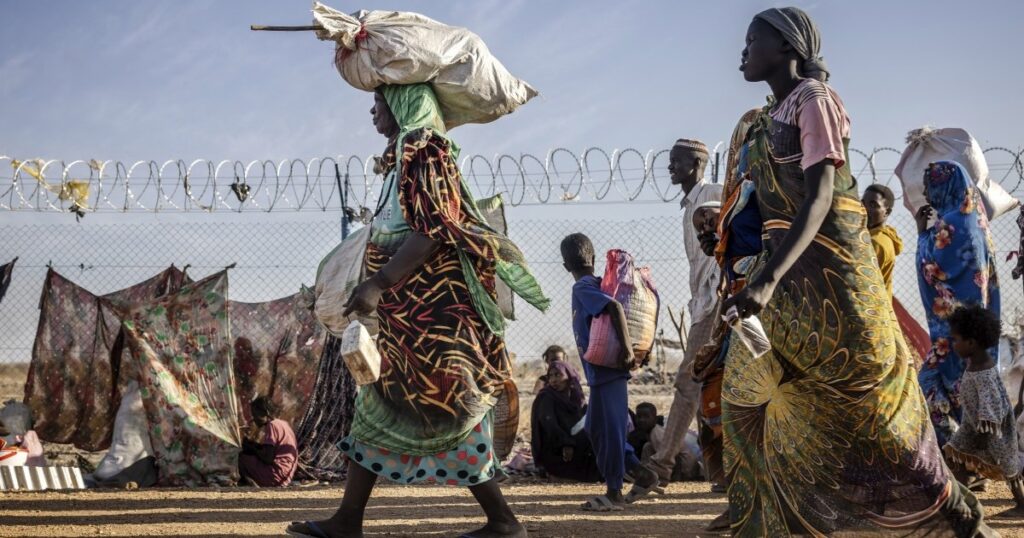The U.N. human rights chief said the apparent and deliberate denial of safe access for humanitarian aid agencies in war-torn Sudan may amount to a war crime.
“Sudan has become a living nightmare. Almost half the population, 25 million people, are in urgent need of food and medical assistance. Around 80 percent of hospitals have been closed,” said Volker Turk, UN High Commissioner for Human Rights. he said on Friday.
He told the United Nations Human Rights Council in Geneva that the Sudanese crisis “continues to show an insidious disregard for human life,” adding that many of the violations of international humanitarian law by the parties to the conflict “are or may amount to war crimes.” There is a gender,” he said. and other atrocious crimes.”
The Rapid Support Forces (RSF), a paramilitary group, has been fighting the Sudanese army for control of the country since April last year, leaving thousands dead at home and abroad, millions displaced, and warnings of famine. It's out.
Turk noted that heavy artillery was used even in densely populated urban areas, and said both sides “killed thousands of people and appear to show no remorse.”
He said at least 14,600 people had been killed and 26,000 injured in 11 months. “The actual number is definitely higher.”
Noting the impact of the apparent denial of aid, he called on parties to the conflict to “fulfill their legal obligations by opening humanitarian corridors without delay, before more lives are lost.”
Aid supplies have been looted and humanitarian workers attacked, while international organizations and NGOs complain of bureaucratic obstacles to accessing military-controlled Port Sudan to deliver humanitarian aid into the country. It's leaking.
Last month, the United Nations called on countries not to forget civilians and appealed for $4.1 billion to meet humanitarian needs and support the more than 1.5 million people who have fled to neighboring countries.
“With more than 8 million people forced to flee within Sudan or to neighboring countries, this crisis has transformed the country and seriously threatens the peace, security and humanitarian situation across the region,” Turk said.
Rape as a weapon of war
The Rights Commissioner also highlighted another weapon in Sudan's continuing war.
“Sexual violence as a weapon of war, including rape, has been a defining and despicable feature of this crisis from the beginning,” he said.
Since April last year, his team has recorded 60 cases of conflict-related sexual violence, with at least 120 victims across the country, the majority women and girls, he said, but added: “These numbers sadly vastly underestimate the reality,” he added. ”
“Men in RSF uniforms and armed groups affiliated with the RSF are reportedly involved in 81 per cent of documented incidents,” Turk said.
Sexual violence by the RSF and its allied militias was widespread, according to a report to the United Nations Security Council obtained Thursday by The Associated Press.
The Committee of Experts said reliable sources in the western Darfur city of Juneina said women and girls as young as 14 were raped in their homes by RSF elements in a UN World Food Program storage facility controlled by paramilitary groups. Stated. Or when returning home to retrieve her belongings after being displaced by violence. Additionally, 16 girls were reportedly abducted by her RSF soldiers and raped in RSF homes.
“Racial slurs against Masalit and non-Arab communities formed part of the attack,” the commission said.
“Neighborhoods and homes were continually attacked, looted, torched, and vandalized,” and residents were harassed, assaulted, sexually abused, and sometimes He was executed.
The Committee stressed that unjustified and indiscriminate attacks against civilians, including torture, rape, murder, and destruction of critical civilian infrastructure, amount to war crimes under the 1949 Geneva Conventions.
“Perpetrators of horrific human rights violations and abuses must be held accountable without delay,” Turk said Friday.
“And the international community must refocus its attention on this deplorable crisis without delay, before things descend into further chaos. The future of the Sudanese people depends on it.”

